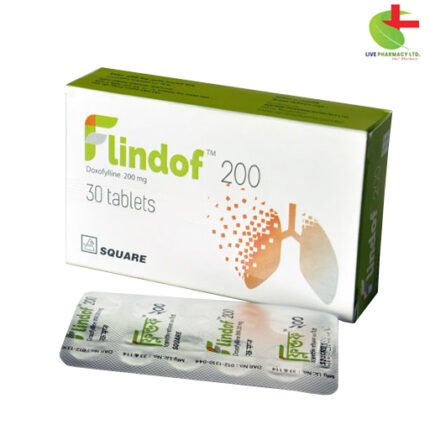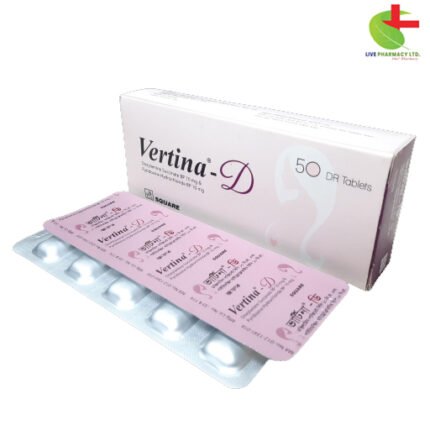Flindof 400
100.00৳ Strip
- Flindof: A proven medication for respiratory ailments like bronchial asthma, bronchospasm, COPD, and spastic bronchial conditions.
- Powered by Doxophylline: A modern bronchodilator targeting phosphodiesterase 4, providing targeted relief.
- Flexible Dosage: Tailored options for adults and children ensure effective treatment under physician guidance.
- Emphasis on Safety: Flindof prioritizes safety and efficacy, prescribed for optimal respiratory health.
 Brand
Brand
|
Square Pharmaceuticals PLC |
|---|---|
 Generics
Generics
|
Doxophylline |
Indications
Flindof serves as a remedy for the following conditions:
- Bronchial asthma
- Bronchospasm
- Chronic obstructive pulmonary disease (COPD)
- Pulmonary disease with a spastic bronchial component.
Pharmacology
Doxophylline, a modern bronchodilator, distinguishes itself from Theophylline with the addition of a dioxolane group in position 7. It selectively inhibits phosphodiesterase 4, relaxing bronchial smooth muscle. Unlike Theophylline, Doxophylline exhibits reduced affinities toward adenosine A1 and A2 receptors, contributing to its enhanced safety profile. Additionally, Doxophylline is known to inhibit platelet activating factor (PAF) and the production of leukotrienes.
Dosage & Administration
- Elderly: Two or three times daily intake of a 200 mg tablet.
- Adults: Two or three times daily intake of a 400 mg tablet or as directed by a physician.
- Children:
- 12 years of age: Two or three times daily intake of 10 ml syrup or a 200 mg tablet.
- 6-12 years of age: Twice daily intake of 6-9 mg/kg body weight, for example, a 10 kg body weight necessitates 3 ml (60 mg) twice daily, or as directed by a physician.
- For a required daily dose of 400 mg, Doxophylline SR tablet can be taken once daily or as prescribed.
Interaction
Avoid combining Flindof with other xanthine preparations. It’s advisable to limit caffeine consumption from beverages and food. Use caution when administering Flindof alongside ephedrine or other sympathomimetic drugs. Concurrent use of certain medications such as erythromycin, TAO, lincomycin, clindamycin, allopurinol, cimetidine, influenza vaccine, and propranolol may impact hepatic clearance of xanthine derivatives, necessitating dosage adjustments.
Contraindications
Doxophylline is contraindicated in individuals with hypersensitivity to the drug or other xanthine derivatives, acute myocardial infarction, hypotension, and during lactation.
Side Effects
Possible side effects of xanthine derivatives include nausea, vomiting, epigastric pain, headache, irritability, insomnia, tachycardia, extrasystoles, tachypnea, and rarely hyperglycemia or albuminuria. Severe cardiac arrhythmias and tonic-clonic seizures may occur in case of overdose.
Pregnancy & Lactation
While animal studies show no interference with pre and postnatal growth, the effects of Doxophylline during pregnancy lack sufficient clinical evidence. Use during pregnancy should be carefully evaluated based on the risk-benefit ratio. Doxophylline is contraindicated during lactation.
Precautions & Warnings
Factors such as age, congestive cardiac decompensation, chronic obstructive pulmonary disease, severe liver disease, concomitant infections, and concurrent medication use may affect hepatic clearance of xanthine derivatives. Monitoring of blood drug levels is recommended in such cases.
Overdose Effects
Overdose may lead to severe cardiac arrhythmias and tonic-clonic seizures. Discontinuation of treatment may be necessary, followed by potential resumption at lower doses after toxicity symptoms subside. Symptomatic treatment of cardiovascular collapse is advised.
Therapeutic Class
Flindof belongs to the therapeutic class of bronchodilators, specifically methyl xanthine derivatives.
Storage Conditions
Store in a dry place away from light and heat, and out of the reach of children. Flindof should be used only with a prescription from a specialist physician.













Reviews
There are no reviews yet.